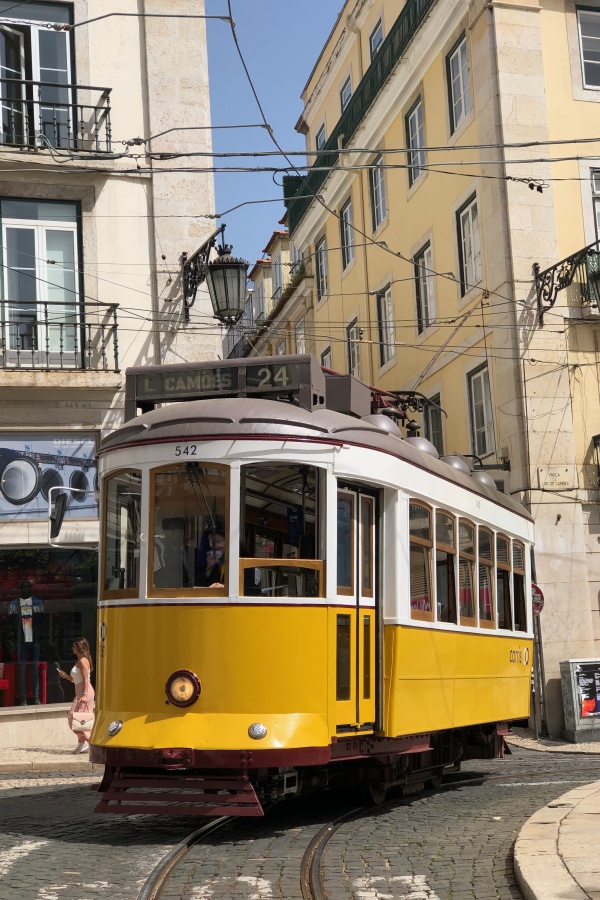Don’t miss the rest of our responsible tourism guides:
MADRID | BARCELONA | SAN SEBASTIAN | SEVILLE | ROME | PARIS
There’s a Portuguese saying that roughly translates to “good behavior starts at home.”
Being a “good” tourist is not as hard as it sounds: don’t do things in your destination that you wouldn’t do in your own home country. Common sense will get you far, and paired with these four golden rules of how to be a responsible tourist in Lisbon, the Lisboetas will be sad to see you go.

1. Choose accommodation wisely
Short-term rentals were a blessing in 2011 during the economic crisis. Renting our houses to tourists staying in the city for a couple of weeks meant residents could keep up with mortgage payments. Travelers to Lisbon, on the other hand, got the coveted like-a-local experience. It was a win-win situation.
But then tourism exploded and so did short-term rentals, with real estate dealers buying whole buildings for a bargain and selling them to investors and entrepreneurs who turned them into apartments for tourists only. Alfama, the oldest and most typical neighborhood in Lisbon, was the first to feel that wave—and not in a good way.

Photo credit: Sandra Henriques Gajjar
Of course, tourists alone can’t solve the current housing crisis in Lisbon and for families traveling together, renting an apartment is simpler, more comfortable and cheaper than booking a hotel.
If staying at a hotel is not a viable option, choose a short-term rental in a less crowded area of the city (easy to spot on any Lisbon map online) or, when possible, rent a room instead of the whole unit. This way, the apartment remains part of the local housing ecosystem and your economic contribution stays in the city. Dismiss any so-called “superhosts” with more than one unit to rent or with all units in the same building. That’s a key sign of companies disguised as local entrepreneurs trying to make a side income.
2. Think twice about free tours
Not tipping is an option in Portugal. Not paying for a service is not. In cafes, restaurants, hotels and taxis this is obvious. So why are guided tours any different?
Regardless if tourists intend to pay their guide handsomely with a generous tip in the end, it’s not enough to break the loop of supply and demand. Professionals should be paid for their work and their expertise, but in many cases with free tours, the guide actually has to pay the company in order to work! Additionally, free tour groups are often too large and navigating around them makes daily life challenging for locals. For any tour that you plan to take while traveling, familiarize yourself with the ethics of the company and the group size before signing up.
If a tour is out of your budget, explore the city on your own with the help of a free mobile app. Sure, it will lack the human touch and the knowledge of a professional guide, but who knows where your explorations will lead you!
3. Souvenir shop ethically
Buying Lisbon souvenirs can be tricky for the misinformed, particularly if the unique souvenir you’re looking for are Portuguese tiles (azulejos).
This is a typical scenario: you’re strolling through Feira da Ladra (Lisbon’s flea market) and come across the irresistible bargain of antique tiles. You’re so focused on this rare find that there are questions that don’t even cross your mind. Like, how authentic are they? Or where do they come from?
There are two possible outcomes. Either the tiles are antique, but they’re 19th-century industrial. Meaning, technically, they’re still antiques, but the value is not as high as you may be led to believe. Or, they are historical tiles illegally carved off of protected buildings.
It’s not less authentic to buy a tile that was handmade last week or the mismatched leftovers of a 1960s collection—and it’s the responsible thing to do. We believe the value of a souvenir comes from its story, not the price tag or the rareness.

Photo credit: Cortiço & Netos
4. Know the ins & outs of public transportation
To (almost) perfectly navigate the public transportation system in another city, you need to master yours in your hometown or at least understand how it works. If you’re not a public transportation user in your country, there’s a big chance you’ll struggle elsewhere, because it is a system you learn over time and with a lot of practice.
Learning how much a ticket costs and where to buy it is a start but it’s not enough. Some basic ground rules include respecting the line, waiting for people to come out of the Metro before getting in, knowing where to exit from the bus (in Portugal, it’s the back), and giving up your seat to those who need it most (for reference, the seats are of a different color).
Ask yourself: can you replace a ride on Lisbon tram 28 with any other streetcar? Our secret tip is that if you’re in the tram line for the vehicle, not the route, trams 12E, 18E, 24E, and 25E are equally old, yellow and Instagrammable.

Follow these tips and you can leave Lisbon knowing you’ve been a great tourist. Don’t stop there—take a look at the rest of our responsible tourism guides:
Nice debate about Lisbon thanks
Thanks for your comment, Eric!